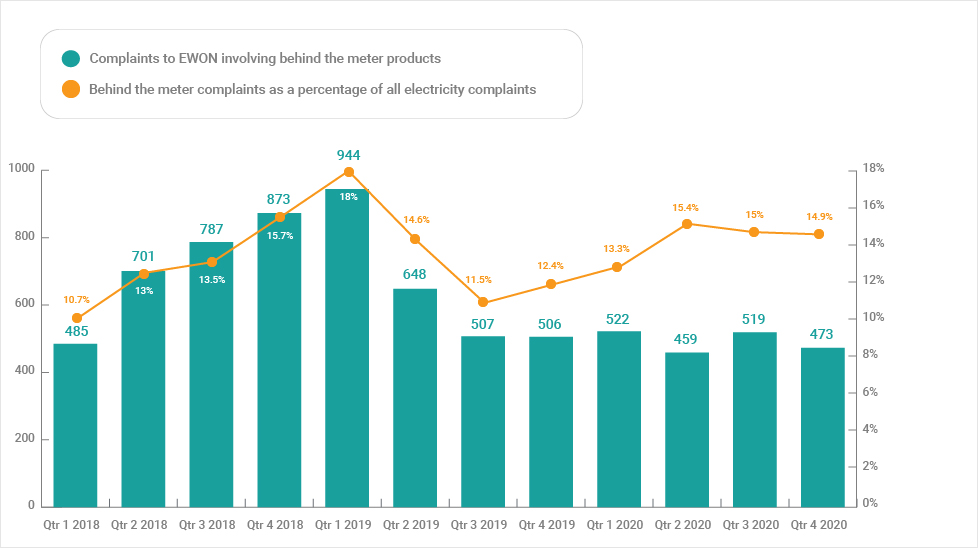-
Home
-
Publications and submissions
-
Reports
-
EWON Insights
-
EWON Insights Oct-Dec 2020
- Behind the meter
Behind the meter
The rollout of digital meters continues to be a factor in the complaints we receive from customers with behind the meter products, such as rooftop solar systems and battery storage. While the number of complaints about meter installation delays have now significantly reduced, customers still complain to us about other metering issues affecting their behind the meter product. The problems experienced by customers include errors during the installation of the meter, such as incorrectly programming the network tariffs, or technical problems, like black spots in mobile phone coverage.
Table 6 - Behind the meter (solar and storage batteries) quarterly complaints to EWON 2018-2020

Table 7 - Behind the meter (solar and storage batteries) complaints to EWON 2017-2020
.jpg)
Case studies
Lack of mobile phone reception leads to estimated bills
A customer installed a rooftop solar system at her property and requested a digital meter. The customer told us that since the digital meter was installed, bills issued by her retailer were based on estimated readings. The estimated bills she received did not reflect the electricity generated by her rooftop solar system and she was not receiving credits for solar exported to the grid.
The customer contacted her retailer to complain on multiple occasions. The customer was advised by the retailer that the technician who installed the digital meter failed to inform the retailer that there was no mobile phone coverage at their property. The customer noted that the issue remained unresolved and the retailer had not provided her with any information on what options were available to resolve the issue.
We referred the matter to the retailer for resolution at a higher level and advised the customer that she could return to us if an agreed outcome could not be reached.
Complaints about solar installations
Behind the meter products are a significant investment with long term benefits. It is understandable that solar and battery installers offer financing arrangements to help a wide range of customers access more affordable energy. However, it is critical for consumers to clearly understand the financing arrangements being offered by solar companies and energy retailers. With any long-term agreement, it is difficult for a customer to anticipate all future changes to their personal circumstances. Therefore, consumers should be aware of the terms and conditions that apply to ending the agreement early. The following case study also highlights the importance of providing consumers with behind the meter products, access to independent external dispute resolution.
Confusion over solar contract balance after customer moves out of property
A customer arranged for the installation of a rooftop solar system with his energy retailer. The retailer’s solar contract required the customer to make repayments of $76 per month for 15 years. Five years after the rooftop system was installed, the customer needed to move out of the property due to a change in personal circumstances. The retailer notified the customer that the contract was cancelled after the sale of the property was completed. The retailer also advised that the customer would be asked to pay the balance of the solar contract via a payout clause. The customer then received an invoice for $4,045.
The customer complained to the retailer that the final amount was incorrect and after the payments he had already made, it should be just over $2,500. The customer did not receive a response for several weeks and continued to be debited for the monthly repayment of $76. The retailer finally responded to the customer’s complaint with a reduced amount to pay of $3,000. The customer asked the retailer to provide him with a breakdown of how the amount was calculated. The customer complained to us that he had received no response to his final request.
We referred the matter to the retailer for resolution at a higher level and advised the customer that he could return to us if an agreed outcome could not be reached.
Complaints about variations in retailer feed-in tariffs
Complaints about electricity price increases have always been a seasonal driver of complaints. Complaints about reductions of the solar feed-in tariff offered by retailers, or changes to the structure of a retailer’s solar energy plans, are now also common complaints received by us at the beginning of each financial year.
Each year, there can be significant changes to the feed-in tariffs offered by retailers and customers often have high expectations of the benefits they should be receiving from rooftop solar systems. These complaints can be more difficult to resolve if the customer considers they were not provided with appropriate information about how feed-in tariffs work when making the decision to invest in a rooftop solar system.
Better feed-in tariff leads to loss of discount
A customer purchased a rooftop solar system directly from her energy retailer. At the time she purchased the system, the retailer quoted her a solar feed-in tariff of $0.23 per kWh for a period of two years. When she received her first bill after installation, the feed-in tariff was only $0.07 per kWh.
When the customer contacted the retailer to complain, it explained that to obtain a feed-in tariff of $0.23 she needed to agree to a new two-year contract. The retailer also noted that the new contract would not include the 29% discount that she currently received off her electricity usage.
The retailer had never mentioned she would lose the benefits from her current contract before she could receive a higher feed-in tariff. We referred the matter to the retailer for resolution at a higher level and told the customer that she could return to us if an agreed outcome could not be reached.
The customer returned to us because the complaint remained unresolved. The customer noted that the retailer had explained that it only had two available solar contracts, a contract with a $0.07 feed-in tariff and a two-year contract with a $0.23 feed-in tariff, but that contract did not come with a 29% discount. The retailer did not address her complaint and she was given misleading information about the available energy plans when she was purchasing the rooftop solar system. The customer stated she had phone recordings which demonstrated that the retailer did not provide all the relevant information.
We contacted the retailer to obtain further information about the complaint. The retailer acknowledged the customer’s concerns and apologised for the inconvenience caused to the customer. The retailer confirmed that it could not offer a contract based on the customer’s expectations, however, offered to provide her with a $100 credit as a customer service gesture to resolve the complaint which the customer accepted.

